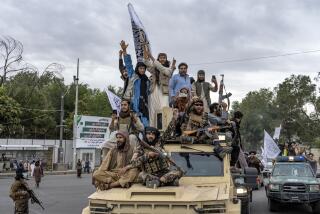Afghan officials acknowledge Islamic State presence in their country
- Share via
Reporting from Kabul, Afghanistan — The Afghan government said Tuesday that forces belonging to the Islamic State militant organization have taken root in the country, its first official acknowledgment that the group based in Iraq and Syria had reached so far to the east.
Officials said the Islamic State presence includes a relatively small number of Afghan and foreign fighters who have not carried out independent operations but were using Afghanistan as a transit point en route to other battlefields.
They have not allied with the much larger Taliban and in some cases have clashed with the Afghan insurgent group, which reports to a different leader and observes a different political ideology, the officials said. But some hard-line Taliban members have pledged loyalty to Islamic State’s top cleric, Abu Bakr Baghdadi.
The Arab militant group’s presence, though still small, adds a fresh complication to the Afghan government’s efforts to make peace with Taliban insurgents as well as the Obama administration’s plans to withdraw the remaining 9,800 U.S. troops by the end of 2016.
“Daesh is here, they do exist,” Abdul Salam Rahimi, chief of staff to Afghan President Ashraf Ghani, said in an interview, using an Arabic acronym for Islamic State.
Afghan officials said they did not believe the Islamic State’s presence would change the Taliban’s calculations on efforts to open the first formal peace talks with Kabul to end more than 13 years of conflict. Since taking office six months ago, Ghani has aggressively courted Pakistan – where Taliban leaders are based – to raise pressure on the insurgents to renounce violence and join his government.
Baghdadi has insulted the Taliban’s leader, Mullah Mohammed Omar, calling him a “fool” and an “illiterate warlord.” Taliban fighters are almost exclusively Afghan and have been focused for over a decade on battling U.S.-led coalition forces and the government in Kabul, not on joining the global jihadist movement.
The groups have clashed in recent weeks in the eastern provinces of Logar and Nangarhar in what local officials described as turf wars, although the reports could not be independently confirmed.
“The Islamic State will likely continue to face considerable resistance from the spectrum of well-established local anti-state actors like the Taliban,” according to a report this month by the Long War Journal, which tracks militant groups worldwide.
The Taliban, the journal added, “perceive their resistance to the Afghan government and coalition forces as the primary and most legitimate alternative to the current political system.”
Over the weekend, a militant commander suspected of ties to Islamic State was killed in an airstrike along with nine other fighters in Helmand province’s volatile Sangin district, a Taliban stronghold where the Afghan military has been carrying out an offensive.
Afghan army officials confirmed they had killed Hafiz Wahidi, who became the second suspected Islamic State commander killed in Afghanistan this year. Wahidi’s predecessor, Mullah Abdul Rauf, a former Taliban commander and Guantanamo Bay prisoner, was reportedly killed in Helmand in February, although accounts differed as to whether he died in a U.S. drone strike or an Afghan army operation.
The top U.N. official in Afghanistan, Nicholas Haysom, said on Monday that Islamic State had “firm roots” in the country.
An Islamic State presence in Afghanistan has been rumored for months, although many of the reports proved false. In September, black flags allegedly representing the militant group appeared in a battle in Ghazni province, but officials and residents later said the flags belonged to Islamic State sympathizers and “copycats” rather than hardened members.
In February, local officials in the southern province of Zabul blamed Islamic State fighters for kidnapping 30 members of the Hazara ethnic minority. An Afghan official with knowledge of the matter said the kidnapping was arranged by a disgruntled former Taliban commander with aspirations of joining Islamic State, who was trying to avenge the seizure of a weapons shipment by coalition forces.
Karim Matin, the newly appointed governor of the eastern province of Paktika, said “mainly Chechens and Arabs” loyal to Islamic State had been spotted there recently. They were using the province as a “stop-over point” on the way to locations that Matin did not specify, although Paktika province sits across the border from Pakistan.
Ajmal Obaid Abidy, spokesman for Ghani, said Islamic State was trying to recruit more fighters in Afghanistan.
“They are a threat not just to Afghanistan but the entire region,” Abidy said.
Special correspondent Latifi reported from Kabul and Times staff writer Bengali from Ranchi, India.
Follow @SBengali on Twitter for new out of South Asia
More to Read
Sign up for Essential California
The most important California stories and recommendations in your inbox every morning.
You may occasionally receive promotional content from the Los Angeles Times.














